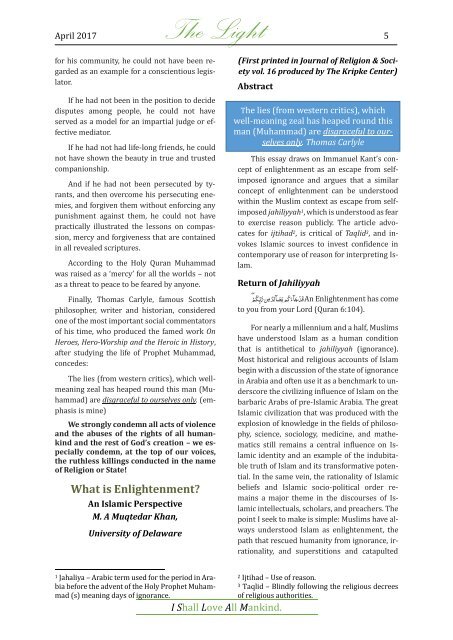2017 04 The Light April 2017
monthly Journal of the Ahmadiyya Association for the Propagation of Islam. Presenting Islam as a tolerant, liberal and peaceful religion as practiced by the Holy Prophet Muhammad (s).
monthly Journal of the Ahmadiyya Association for the Propagation of Islam. Presenting Islam as a tolerant, liberal and peaceful religion as practiced by the Holy Prophet Muhammad (s).
Create successful ePaper yourself
Turn your PDF publications into a flip-book with our unique Google optimized e-Paper software.
<strong>April</strong> <strong>2017</strong> <strong>The</strong><br />
<strong>Light</strong> 5<br />
for his community, he could not have been regarded<br />
as an example for a conscientious legislator.<br />
If he had not been in the position to decide<br />
disputes among people, he could not have<br />
served as a model for an impartial judge or effective<br />
mediator.<br />
If he had not had life-long friends, he could<br />
not have shown the beauty in true and trusted<br />
companionship.<br />
And if he had not been persecuted by tyrants,<br />
and then overcome his persecuting enemies,<br />
and forgiven them without enforcing any<br />
punishment against them, he could not have<br />
practically illustrated the lessons on compassion,<br />
mercy and forgiveness that are contained<br />
in all revealed scriptures.<br />
According to the Holy Quran Muhammad<br />
was raised as a ‘mercy’ for all the worlds – not<br />
as a threat to peace to be feared by anyone.<br />
Finally, Thomas Carlyle, famous Scottish<br />
philosopher, writer and historian, considered<br />
one of the most important social commentators<br />
of his time, who produced the famed work On<br />
Heroes, Hero-Worship and the Heroic in History,<br />
after studying the life of Prophet Muhammad,<br />
concedes:<br />
<strong>The</strong> lies (from western critics), which wellmeaning<br />
zeal has heaped round this man (Muhammad)<br />
are disgraceful to ourselves only. (emphasis<br />
is mine)<br />
We strongly condemn all acts of violence<br />
and the abuses of the rights of all humankind<br />
and the rest of God’s creation – we especially<br />
condemn, at the top of our voices,<br />
the ruthless killings conducted in the name<br />
of Religion or State!<br />
What is Enlightenment?<br />
An Islamic Perspective<br />
M. A Muqtedar Khan,<br />
University of Delaware<br />
(First printed in Journal of Religion & Society<br />
vol. 16 produced by <strong>The</strong> Kripke Center)<br />
Abstract<br />
<strong>The</strong> lies (from western critics), which<br />
well-meaning zeal has heaped round this<br />
man (Muhammad) are disgraceful to ourselves<br />
only. Thomas Carlyle<br />
This essay draws on Immanuel Kant’s concept<br />
of enlightenment as an escape from selfimposed<br />
ignorance and argues that a similar<br />
concept of enlightenment can be understood<br />
within the Muslim context as escape from selfimposed<br />
jahiliyyah 1 , which is understood as fear<br />
to exercise reason publicly. <strong>The</strong> article advocates<br />
for ijtihad 2 , is critical of Taqlid 3 , and invokes<br />
Islamic sources to invest confidence in<br />
contemporary use of reason for interpreting Islam.<br />
Return of Jahiliyyah<br />
An Enlightenment has come ب ِكُمْ ۖ<br />
to you from your Lord (Quran 6:1<strong>04</strong>).<br />
قَدْ جَٓاءَكُم بَصَ ٓائِرُ مِن ر ََّ<br />
For nearly a millennium and a half, Muslims<br />
have understood Islam as a human condition<br />
that is antithetical to jahiliyyah (ignorance).<br />
Most historical and religious accounts of Islam<br />
begin with a discussion of the state of ignorance<br />
in Arabia and often use it as a benchmark to underscore<br />
the civilizing influence of Islam on the<br />
barbaric Arabs of pre-Islamic Arabia. <strong>The</strong> great<br />
Islamic civilization that was produced with the<br />
explosion of knowledge in the fields of philosophy,<br />
science, sociology, medicine, and mathematics<br />
still remains a central influence on Islamic<br />
identity and an example of the indubitable<br />
truth of Islam and its transformative potential.<br />
In the same vein, the rationality of Islamic<br />
beliefs and Islamic socio-political order remains<br />
a major theme in the discourses of Islamic<br />
intellectuals, scholars, and preachers. <strong>The</strong><br />
point I seek to make is simple: Muslims have always<br />
understood Islam as enlightenment, the<br />
path that rescued humanity from ignorance, irrationality,<br />
and superstitions and catapulted<br />
1 Jahaliya – Arabic term used for the period in Arabia<br />
before the advent of the Holy Prophet Muhammad<br />
(s) meaning days of ignorance.<br />
I Shall Love All Mankind.<br />
2 Ijtihad – Use of reason.<br />
3 Taqlid – Blindly following the religious decrees<br />
of religious authorities.














